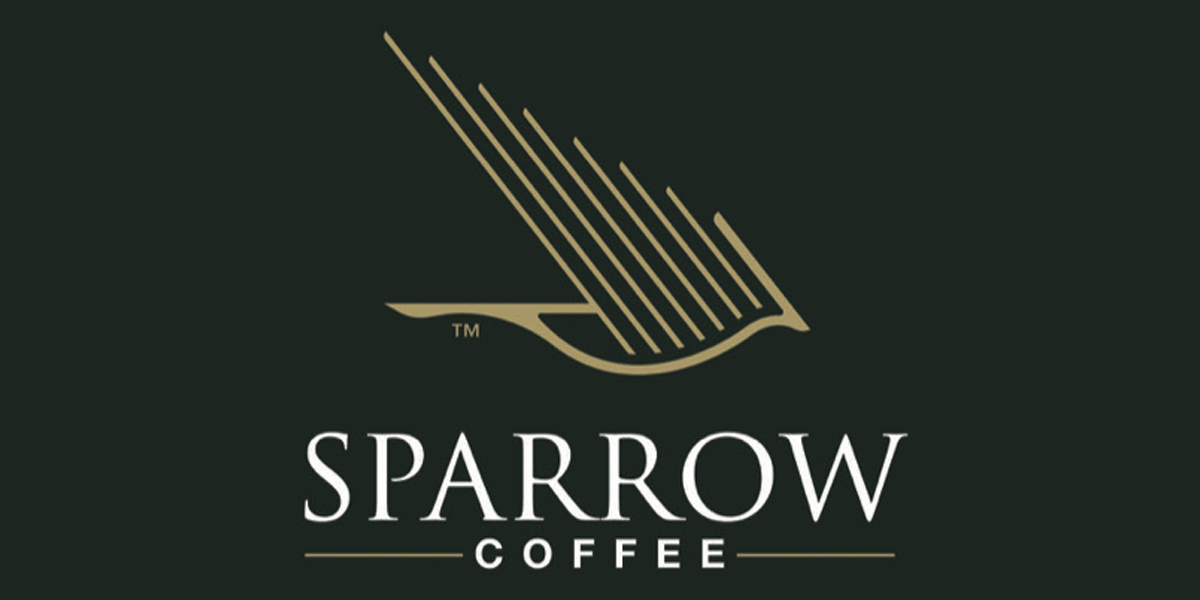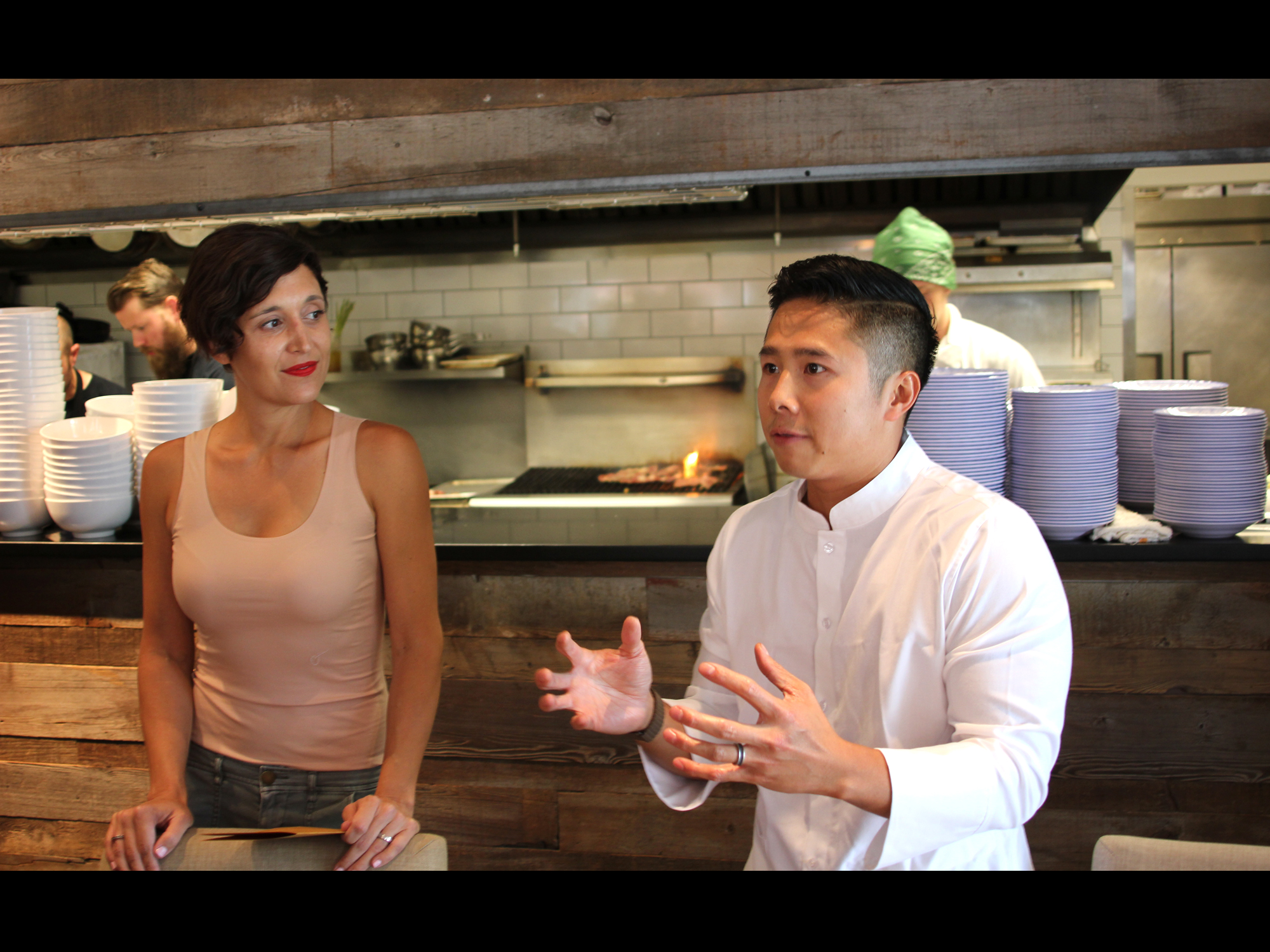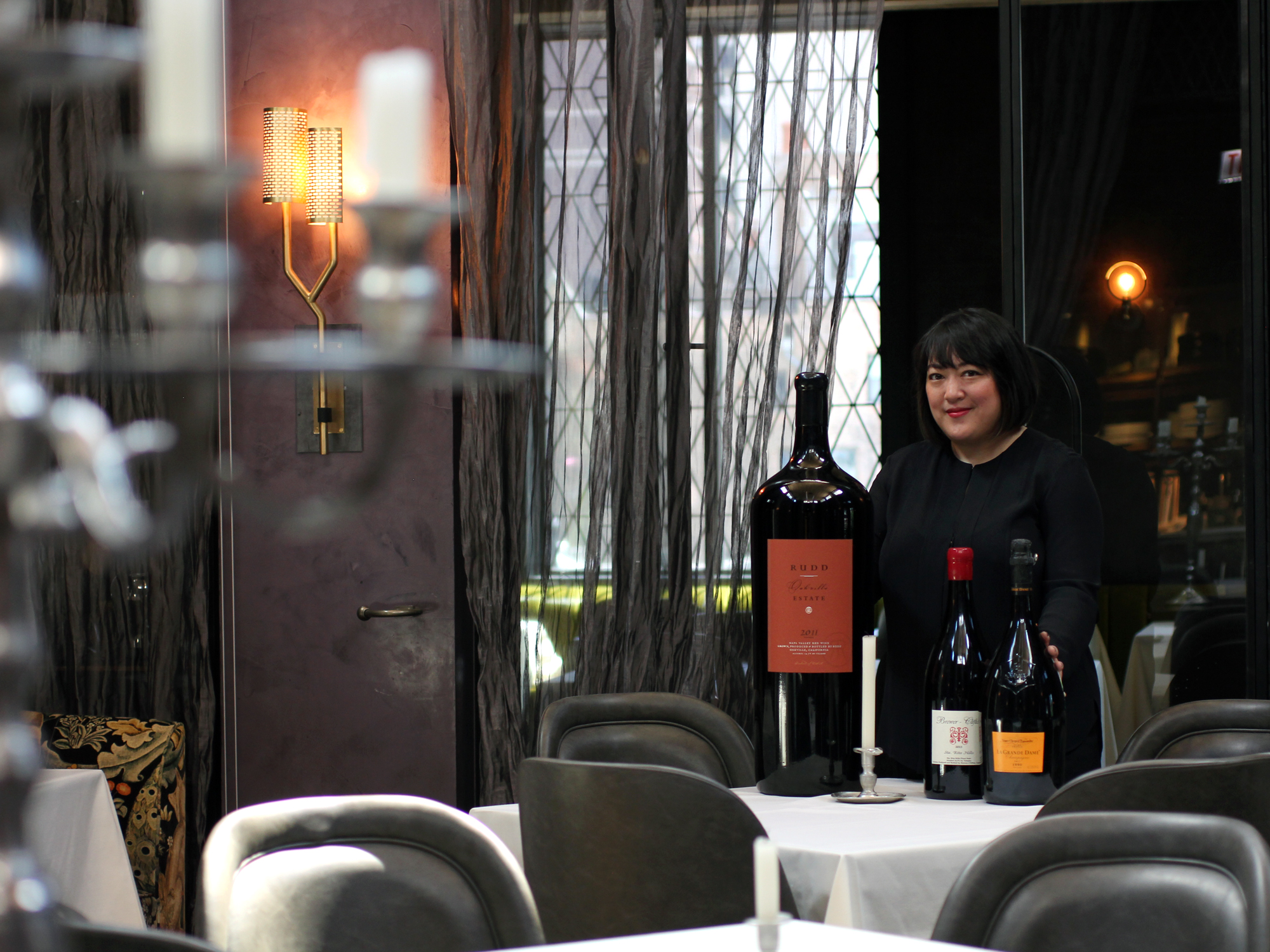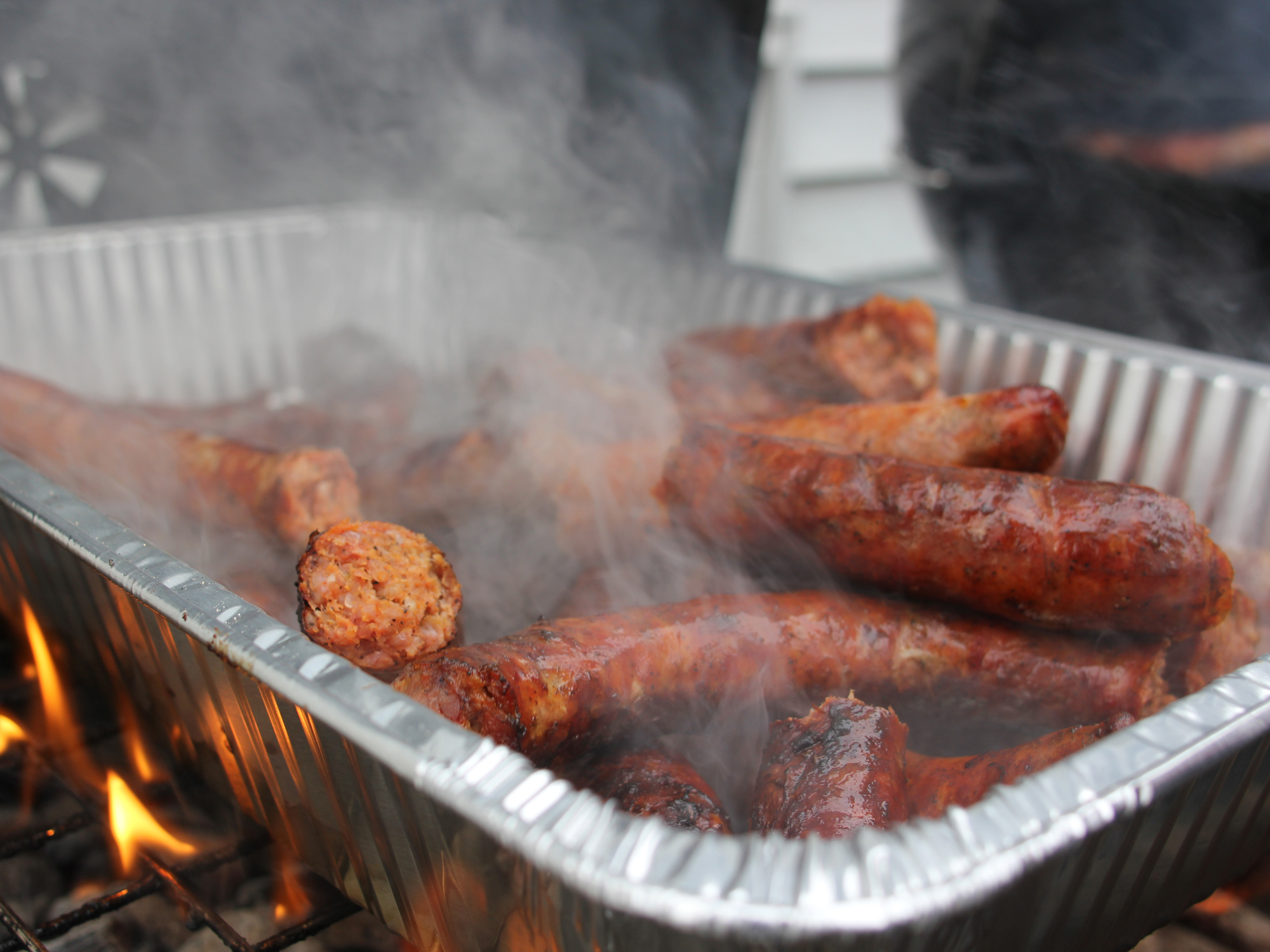TEN YEARS AGO, SOME GUYS DECIDED TO COOK OUT in a Chicago backyard. I know, stop the presses! Them and everybody else. But somehow ManBQue spiraled from a simple get-together into a phenomenon. Part of it was the catchy name and a certain amount of marketing savvy, part of it was harkening back to the drink-in-one-hand, burger-flipper-in-the-other barbecuing traditions of our fathers, and part of it was blending that with the kind of 21st century foodie aspirations that want to one-up the next guy with your mastery of Indonesian stir-fry flavors over fire. Whatever the precise recipe, ManBQue captured the spirit of the times for a certain segment of modern guys looking for an excuse to let loose their inner “urban Viking,” as the site puts it.
Today there are ManBQue events monthly in Chicago, and offshoots in other places. But more than that, there are two ManBQue books: 2014’s ManBQue: Meat. Beer. Rock and Roll, and the recently released Eat Street: The ManBQue Guide to Making Street Food at Home, spreading the philosophy of loud music, louder flavors and cold beer rain or shine to hungry guys everywhere. Many of the recipes are from, or at least inspired by, something somebody brought to a ManBQue event.
I wanted to talk to the guys behind it—alphabetically, they’re John Carruthers, who writes for the investment research firm Morningstar, John Scholl, who works for Cicerone.org, a beer industry group, and Jesse Valenciana, who’s Field Activation Coordinator for Goose Island Beer Company. But it seemed lame to just meet them at a frickin’ coffee shop, when I could con them into cooking for me. So with some prodding, they invited me to join them in Carruthers’ Lincoln Square backyard as they each whipped up a ManBQue greatest hit. Listen to our full conversation as they prepped for dinner here, or read the edited transcript below. (Please note that this is a conversation between guys, and there is the occasional bad word.)
Subscribe to Fooditor Radio at iTunes or Stitcher.
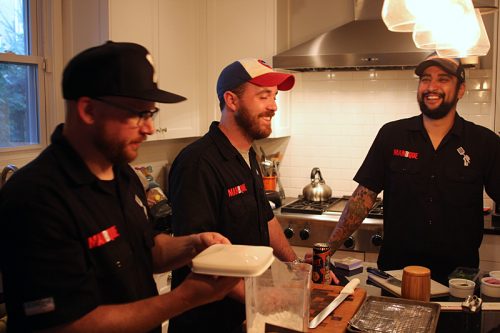
John Scholl, John Carruthers and Jesse Valenciana
FOODITOR: So how did ManBQue get started?
VALENCIANA: I was living in Logan Square, and I had a girlfriend that I was living with, and we used to grill out all the time. She happened to be out of town and I decided to invite a few friends over. Realistically, it was just going to be a barbecue for the dudes.
And a friend of mine was very proud of who he was dating at the time—he was a hotshot radio marketing guy—and he’s like, do you mind if I bring so-and-so over? And I’m like, no, it’s a man-becue. And somebody shouted “ManBQue!” And everybody followed that with “ManBQue!,” and that’s how the name was born.
We were hanging out, around two in the morning, when all good ideas are born, and we decided to do it every month. Honestly, the second month, somebody had emailed me two days before and said “So, is ManBQue this Thursday?” And I’m like… yeeeahhhh. I had to talk to the girlfriend and say, “By the way, this Thursday I’m having a ManBQue.” She goes, “What the hell’s a ManBQue?” And I said, “Just a bunch of guys drinking beer and grilling.”
CARRUTHERS: It was pretty ad hoc, and tongue in cheek, from the start. Although occasionally we get the nasty email that says “My boyfriend said he had to go to a ManBQue and I couldn’t come, and you know discrimination is wrong.” I’m like, chill…
VALENCIANA: Meanwhile the e-mail is Sexyeyes69@hotmail…
CARRUTHERS: “I’d never allow him into my Gray’s Anatomy party, but that’s totally different.”
That has to come up, your horribly sexist name and clear woman-hating tendencies—
Well, the name is tongue in cheek—we love it now, it’s great to yell—and we actually have coed events at least quarterly. The first time we ever did one of these—CoedBQue, we call it, slightly less catchy—this girl who was dating one of our members won. She had an amazing dish—we have judging and stuff. We were giving away a bottle of liquor or something. She went up and got the prize, and then by way of victory speech, she slugged the rest of her beer, said “The money’s on the dresser,” and walked off.
I was like, how can I be hosting this thing and not know how to cook? And I started kind of teaching myself how to make better things.
Hey, if you’re gonna set this framework, you gotta be able to take it.
What was the idea of it as it was being born out of drunken notions?
VALENCIANA: It was really just a reason—a selfish reason on my part—all my friends were getting married and moving out to the burbs, and it was a way to keep in touch with everybody. I had a perfect place, a rooftop deck, had a great view, we could be as loud as we wanted to, for the most part.
Everybody gets a ManBQue nickname, and the third or fourth month, this guy Joey Grease invited this friend, later to be known as Wolverine because of his hair. He was a chef. And up to this point we were cooking Bubba Burgers and we thought that was gourmet, burgers and drinking Old Style. And he had made some steak rolls, and the stuff was awesome. And everybody said wow, this stuff is amazing.
So for me, I was like, how can I be hosting this thing and not know how to cook? And I started kind of teaching myself how to make better things. And everybody just shifted, and started bringing better recipes.
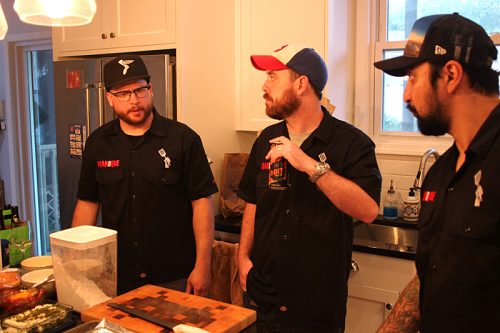
The same thing with the beer. One guy brought a mixed six-pack of different beers, and it was like, oh cool, good beer.
CARRUTHERS: This is where being a man-focused thing completely charged the evolution. Because we got venal and competitive with each other as much as we could. And along the way the food got way better, the beer got way better. We knew it was getting big when people we didn’t know were coming. Your friends are there, and then they’re bringing a friend, and eventually it’s a bunch of people that you’re just meeting for the first time.
Did the people who’d come bring things that justified their being there?
Not always—
SCHOLL: They still don’t. Like even today, we’ll have a guy who’ll bring, like, a package of bacon from Jewel.
CARRUTHERS: And then tell one of us to cook it. Like “Oh, here, how do I get this cooked?” Oop, nope, you got that one, boss.
SCHOLL: Part of ManBQue is because we all came from trying to cook bacon on the grill. We really don’t judge too hard—
CARRUTHERS: We’ve never, like, bashed someone’s dish. If you want constructive criticism, you can get some really good pointers on your cooking. Because these are people who are big on eating out, or big into cooking, or big into beer, and you get some really nice, thoughtful responses on your food, and it helps you become a better cook. But at the same time, somebody can just show up with Johnsonvilles because he wants to have a good time and hang out with the guys and drink some beer—that’s totally great. It’s just, you have to make the effort. Like, “I’m not a great cook so I’m not going to cook at ManBQue”—you can’t do that.
SCHOLL: You can’t just show up to eat other peoples’ food.
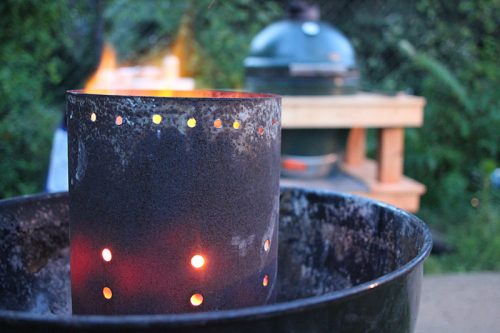
Has your own cooking changed a lot over the last ten years of ManBQue?
VALENCIANA: It’s been a really great learning tool for a lot of people that have come through ManBQue. Guys who were like, “I didn’t know I could do this,” and that comes from the feedback that we all give when somebody makes a recipe. It’s an outlet that gets people to try something way different that they’ve never done, and still be able to get honest feedback—instead of just making another burger for you and your girlfriend at home. It’s like, here, I’m going to feed these dudes and see what people say.
SCHOLL: For me, I’ll come and I’ll say, I’m trying this new thing, tear it apart. And Jesse and John know that they can and I’m not going to go home all offended. I’m going to take that criticism and really try to make my dish better. Now, somebody who’s new, and brings a mediocre dish, we’re not going to able to criticize them as much.
CARRUTHERS: And usually, nothing’s bad. If it’s bad, it’s bad enough to where it becomes a story later between the three of us, and that doesn’t happen all that often.
VALENCIANA: There’s been some bad cole slaw.
CARRUTHERS: There have been some disastrous experiments with molecular gastronomy.
Someone cooked lion once, and I think people wanted to burn the place to the ground.
Because it was lion?
It was from Czimer’s. Back then if someone sent the recipe, we’d just post it straight up, I didn’t use to edit—but the lion thing went totally…
VALENCIANA: I texted John because of the feedback we were getting online, and said, just take the recipe down.
CARRUTHERS: When people got upset about Cecil the Lion, some people were surprised. And I was like, oh no, I understand, people get real mad about lion.
SCHOLL: I think one of the bad dishes at ManBQue was my own. I decided to make smelt skewers—
[GROANS from the other two]
—and we had the grill way too hot, and smelt’s a very fragile fish that should be fried. As you put a skewer on, it sticks to the grill, you try to lift it up—and it came right off—
CARRUTHERS: I’m not even sure Grant Achatz could make smelt ash work.
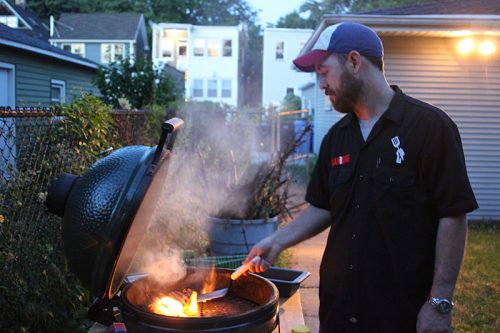
Not to sound tech-bro-y and startupy, but it’s pretty fun to fail now and then. It’s like, “I really learned something from that stupid thing I did.” It’s fun. You never know what you’re going to eat every month. We used to put themes on it, and we found that that would make people a little less creative.
SCHOLL: But then people come back and ask for it, too. I think a broader theme—like we’ve done ones where it’s just wings, come up with the best wing recipe.
CARRUTHERS: Well, for the first book we put out a call, we invited people, put it up on Chicagoist and stuff, just bring us your best wing recipe, with the recipe written down, and the best wing will go in the cookbook. And oh my God, I didn’t want wings for two months after that.
VALENCIANA: We made sure to say, if you have ghost pepper wings, make sure to tell us so they’re the last thing we eat.
CARRUTHERS: We like spice, but you gotta have a little flavor to it. Don’t just Borax my tongue.
VALENCIANA: I’m glad that that doesn’t happen too much any more—”the hottest hot sauce ever”—oh, cool.
CARRUTHERS: [hardcore voice] “I’m Chef Ironmouth and I’m going to fuck you! I took all the wrong lessons from watching Food TV!”
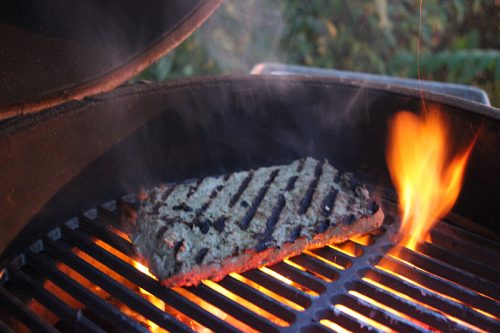
John Carruthers’ choice of a ManBQue greatest hit is gyros on the grill. “This was at one of the very first events, a guy made gyros and showed me that you don’t have to make the gyros cone—it’s basically just making a terrine.”
Speaking of Food TV, tell me how ManBQue became a thing, that eventually led to a book, or two books.
CARRUTHERS: It was like I was talking about earlier, friends or friends of friends—and eventually a lot of those people had more interesting jobs. So Jesse and John knew these people who got us our first little local TV spots, and then recurring kind of spots, and then national spots. And it was when we were on the Today Show that Rick Bayless’s agent just gave us a call out of the blue.
VALENCIANA: I met this guy who was a publisher, a local publishing house. We had talked about writing a book—”With what we’re doing, we should totally write a book!” I went over and I went Hey, I’m Jesse, and he said, Yeah, I know who you are, so you want to publish a book? And I said, Yeah, we do these events, they’re burger and beer pairings—this was years ago, not a lot of people were doing that.
He’s like, “Yeah, whatever, nobody buys books any more. Nobody reads books. I’ve got a stack of manuscripts this high that I’m just going to toss out, because I don’t want to read through them.” In my head I’m thinking that’s really shitty. And he’s like “I dunno, maybe self-publish, it’s only forty thousand bucks, you can write your own book, do whatever you want with it.”
CARRUTHERS: By which he meant, “Ram it up your ass.”
VALENCIANA: Pretty much. And he goes, “You need a literary agent.” Oh cool, I’ll keep my eyes peeled. He goes, well, you won’t just Google a literary agent—
CARRUTHERS: No, you have to set a trap, with peanut butter.
VALENCIANA: That was the last thing he said to me, and he made me feel like the biggest idiot. But in my head I’m like, that’s a challenge.
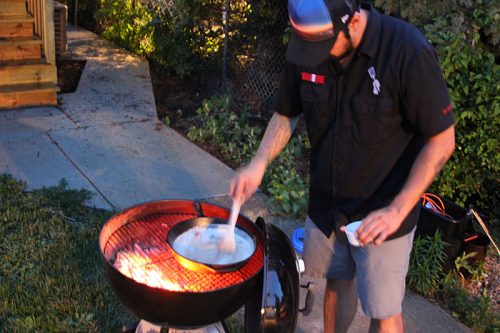
Jesse’s ManBQue greatest hit is mussels, cooked in an iron skillet with beer, a la the Hopleaf. “The easiest thing you can make to impress people is a pan full of mussels.”
Next day, we wake up, we’re on the front page of the Tribune, later on that night we’re on JBTV, which every nerd in Chicago would love to be on, and then that Sunday, we were on Chicago’s Best. It just all happened to be on that weekend. And Doe, our agent, just happened to be in town for a Rick Bayless event, and she turns on the TV to have background noise. And there’s my stupid face—
CARRUTHERS: You know how you’re in a hotel room and you just turn on the TV? Well, she’s from Chicago, even though she’s a Boston agent, so she turns on WGN instead of CNN. And that’s what sealed the deal. Like, how bizarre is that? She represents Jacques Pepin—and also us three idiots.
SCHOLL: I wish she had like summer or winter Christmas parties or something like that, where we all got together and mingled.
VALENCIANA: I really thought it was a joke, because just two days before this guy had been telling me that our best shot was to self-publish.
CARRUTHERS: That kind of thing really added a whole boost to where people were like, “Ooh, I’ve heard about you, you have a book, you guys must be crazy millionaires and soooo advanced. You probably just sit at home grillin’ meat all day.” And I’m like, Yes, we’ll go along with that deception.
VALENCIANA: John does it with his mind, and we have to snap him out of it—John! John!
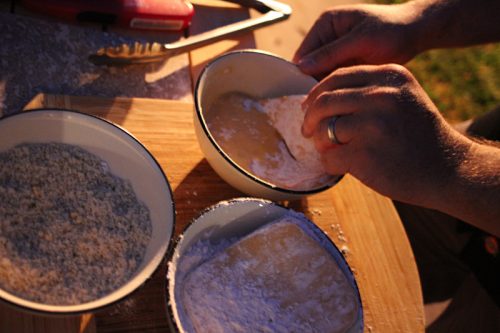
John Scholl’s ManBQue greatest hit is a fried cheese sandwich inspired by one he had in Prague. He dips slices of cheese in a tempura batter and fries them in a wok perched over a blazing starter chimney.
It’s funny, we were at Steve Dolinsky’s barbecue a couple of years ago, and Rick Bayless was there. He was talking to these two ladies, and I kinda slid by him and said, hey, Rick, I just wanted to introduce myself, we have the same agent, and I wanted to say hi. And he said, what agent? And I said Doe Coover, and he stopped talking to these ladies and he said, are you the ManBQue guys? And I’m like, yeah. And at that point I felt like, we really do have an amazing agent, we can’t thank her enough. For her to take a chance on us—I still don’t get it.
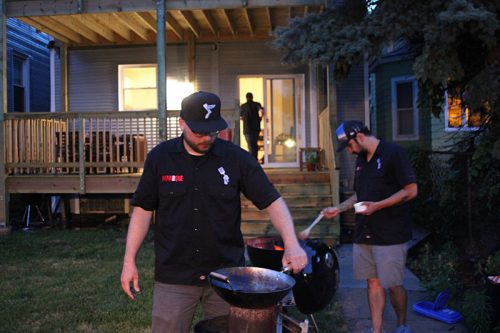
What’s the philosophy of ManBQue food? How would you define it?
VALENCIANA: It’s really a D.I.Y. cooking collective. So it’s pretty much your interpretation of whatever it is that—like, we fall in love with Chicago food. This guy loves Chicago hot dogs, he’s a purist so he does that, but he also does these other takes on Chicago dogs. So it’s that—make food what you want it to be.
CARRUTHERS: And part of the idea, you’ll see names credited in that book, and the other one—
No, I admired how much you got other people to do your work for you.
Well, it would be really disingenuous to have like 200 recipes, and pretend to not give credit to somebody who inspired the original idea. Because we’re not going to go through that delusion that we got semi-notable, with a couple of books, and all of a sudden we’re these just fucking hot shit cooks. We know there’s probably a bunch of people who cook better than us. But where we really succeed is like, bringing in people together, and adding their ideas to ours.
With ManBQue the food is not only our life story, and our influences and our heritage, but the influences and story of everybody who’s ever come to one, and wanted to share the food that they made or the things that they really liked.
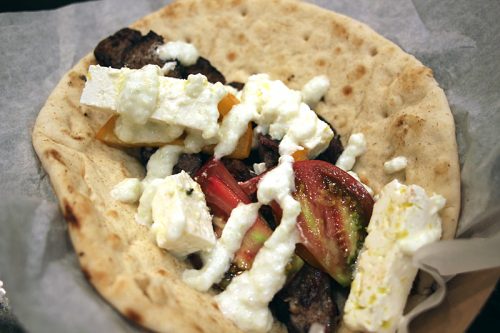
ManBQue gyros
SCHOLL: And I think for us as our personalities, when we travel and we go to a new city, we’re not going to look for the Michelin star rated places—
CARRUTHERS: Depends if my work is paying.
SCHOLL: Even if mine’s paying, I will look for—I’ll get in an Uber and be like, what’s a good street food, what is this city known for, and take me to it.
CARRUTHERS: “Crime and despair.”
VALENCIANA: Oh, Baltimore?
SCHOLL: But the crabs are delicious! I went to Faidley’s, and I had a fried soft shelled crab sandwich on just straight up white bread, very simple—probably one of the best crab sandwiches I’ve ever had. I ate it standing up, and drinking a beer, and I was like, “This is who I am.”
CARRUTHERS: We did the book’s [photo] shoot over four days in different locations, and blue crabs were the one thing on every day’s shot list, and we couldn’t get them. Because you can really only get them at Joong Boo, for the good ones.
SCHOLL: And they sell out every day.
CARRUTHERS: They sell out so quick. Every day we would go over there, we would rush there, and one time Jesse saw this wizened old woman walking away, knees buckling under the weight of the entire fucking cooler of crabs. But eventually we got them and they were… tastayyy.
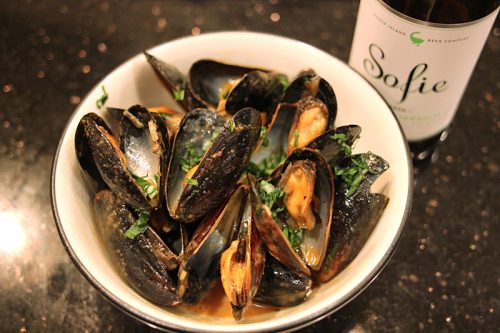
ManBQue mussels, with Goose Island product
Okay, and then “street food.” Let’s talk about that. No one knows what the definition of street food is, what is it for you guys?
CARRUTHERS: It was really just what we wanted to include in here. It was stuff we thought that, if you can have it here…
It was better than calling it “ManBQue’s Second Book?”
CARRUTHERS: “ManBQue Gets To Use Things Other Than the Grill.”
No, so what we did was, you cook it with one technique. You use one thing for a batch, or however much you’re doing. You can usually eat it standing up, or at least like at a counter, with a fork, and a beer in one hand. And it’s flavors from all around the world, but at the same time, I don’t think we’ve made it any secret that it’s very personal to us. Everywhere we’ve traveled, everywhere we’ve been, everywhere we really like to eat and the kind of influences it’s had on us.
If someone will read it and be like, well, what about this, we’ll be like, Yeah! We don’t have it! You should totally go write the definitive recipe for that. Because this is just what we really liked and could get to.
SCHOLL: And we get a lot on social media, especially—
CARRUTHERS: [dumb voice] Is it street food if you—
SCHOLL: Yeah, if you cook it at home, is it still street food?
CARRUTHERS: Make sure when you transcribe this interview, you put in brackets, “dumb voice.”
But no, is it fucking Korean food if you cook it in Milwaukee? I mean, when I boil a potato for my ancestors, I don’t make big bones about how authentic I am. I just eat it—while I pray the rosary.
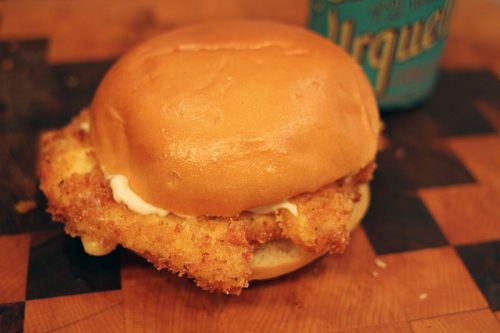
ManBQue Praguewich
Michael Gebert is the kalbi beef taco of Fooditor.
Latest
Join the Discussion
After you comment, click Post. If you're not already logged in you will be asked to log in or register with Disqus.




